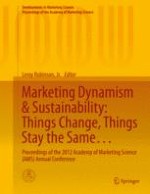2015 | OriginalPaper | Buchkapitel
A Framework to Masure the Co-Created Concept of Value
verfasst von : Shilpa Iyanna, Heidi Winklhofer, James Devlin
Erschienen in: Marketing Dynamism & Sustainability: Things Change, Things Stay the Same…
Verlag: Springer International Publishing
Aktivieren Sie unsere intelligente Suche, um passende Fachinhalte oder Patente zu finden.
Wählen Sie Textabschnitte aus um mit Künstlicher Intelligenz passenden Patente zu finden. powered by
Markieren Sie Textabschnitte, um KI-gestützt weitere passende Inhalte zu finden. powered by
The contemporary view in marketing literature is that value is uniquely and phenomenologically determined by the beneficiary (Vargo and Lusch 2008:7). This conceptualization changes value from being an exogenous variable (Priem and Butler 2001; Srivastava et al. 2001) to an endogenous variable (Lusch and Vargo 2006). This distinction has important ramifications as it implies that value is derived by customers and firms working together to facilitate service success through the co-creation of value (Barnes et al. 2009). Thus value-creating resources are not confined to the firm; customers, suppliers and other stakeholders also contribute operant resources to value creation (Vargo and Akaka 2009). Support for this phenomenological view of value comes from the means-end theory (Woodruff and Flint 2006; Vargo and Lusch 2004. However, a serious drawback of the means-end framework in its current form, is that, it mainly focuses on product attributes/features and the resulting consequences and goals. The, current discussion on value, however, imply that in value co-creation, all parties are resource integrators. Therefore, value assessment based on product attributes alone is limiting. Another long standing criticism of the “means-end theory framework has been that means end chains has generally assumed a static goal structure, with little discussion on how goals evolve” (Huffman et al. 2000: 11). The paper proposes an “extended means-end value framework” (EMEVF) that incorporates the antecedents and implications of value co-creation and thus can be used to measure the co-created concept of value. A qualitative study involving semi-structured interviews was employed to examine the links between the means, consequence and end. The main contributions of the paper are first, that it expands upon the goal development process, and the role of different types of resources in that process, that consumers go through in their pre-purchase deliberations. Second, findings suggest that value co-creation is an all encompassing process and examining the links between the goals and the resources provide a useful way of understanding how consumers infer value from the service. Results are presented using quotes and with visual illustrations of the EMEVF. The paper concludes with a discussion of the results, its implications and directions for future research in this area.
